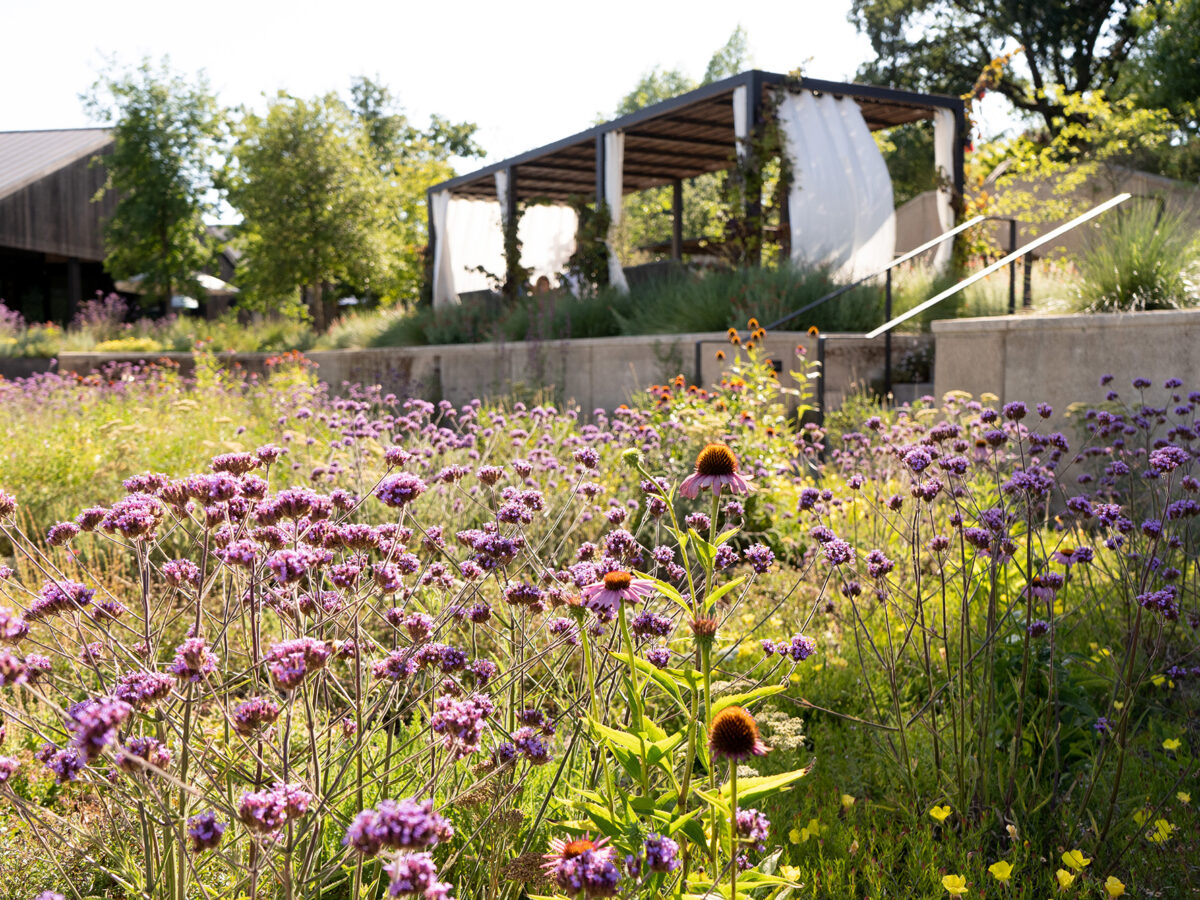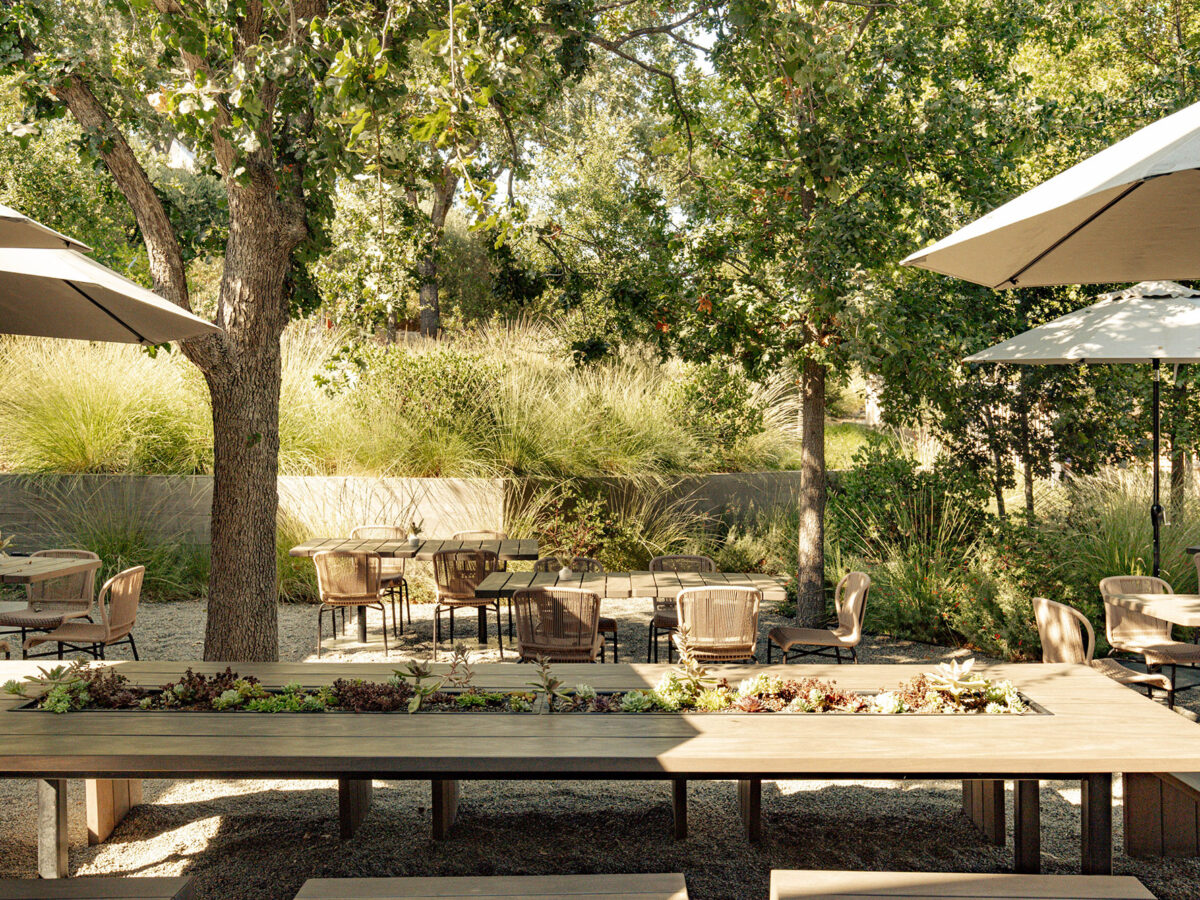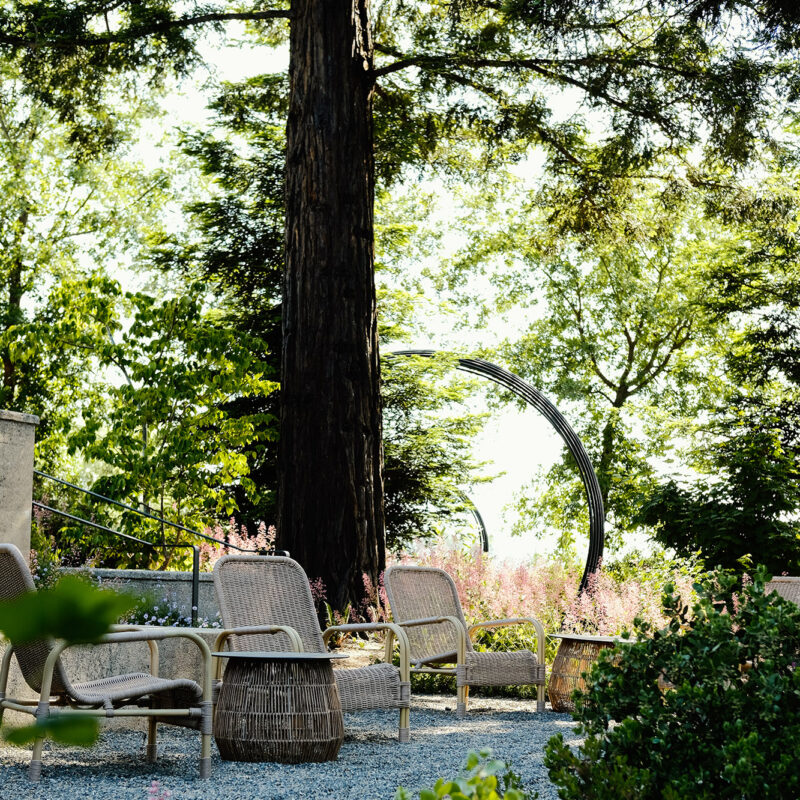
These Lush Outdoor Living Rooms Will Transport You to Wine Country
Learn how the design teams behind Healdsburg’s Flowers Vineyards & Winery created lush outdoor rooms worth lingering in.

Douglas Friedman/Courtesy of Flowers Vineyards & Winery
Nestled among a towering redwood grove on the gorgeous and biologically diverse Sonoma Coast, Flowers Vineyards & Winery just might be the most beautifully landscaped winery—not just in Healdsburg, but in the entire West. At this oasis, with distinct tasting areas mimicking the natural landscape of the region, guests can sip Pinot Noir and Chardonnay not just under majestic redwoods, but within a native landscape that beautifully extends the surrounding shady canopies of the oak woodlands and structural shrubs of the chaparral foothills into quiet, intimate settings.
It’s apparent that the designers behind this project undertook every plant consideration and placement with careful thought and purpose. From the tapestry of flowering perennials visible from the upper terrace to the lacy grasslands blanketing the floor beneath majestic oaks, each section of the garden was implemented with a sustainable mindset and changing seasonal interest, which created outdoor spaces that are not just stunning, but inviting and restorative as well.
If this sounds like something you’d like to re-create in your own backyard, you’re not alone! Regenerative retreats are becoming a top-tier request from homeowners looking to infuse more nature into their daily lives. You don’t have to live next to a vineyard to benefit from this type of landscape design either. The teams at Nelson Byrd Woltz Landscape Architects and Alexis Woods Landscape Design give us their expert insight on how they created this exquisite ecological experience.
Horticultural Harmony

Kate Cunningham/Courtesy of Flowers Vineyards & Winery
What is most impressive about the outdoor areas at Flowers Vineyards is the juxtaposition of hardscape and soft plantings that evokes a harmonic textural experience. The team at Nelson Byrd Woltz Landscape Architects selected regional shrubs such as Frangula californica, Arctostaphylos, Carpenteria californica, and Ceanothus, which all reinforce the structure of concrete walls and create a series of intimate tasting rooms throughout the site allowing for a diverse range of experiences. When it comes to using plants to create privacy, landscape designer Alexis Woods placed shrubs and trees in clusters to create screened-in areas for conversation, while not blocking views of the surrounding landscape. She recommends selecting shrubs that grow no more than 3-4 feet tall so dining tables and chairs can be used within the space and guests can enjoy the surrounding garden while seated.
By leaning into plants hyper-local to your specific outdoor space, you can create an extension of the surrounding ecology, inviting in wildlife that will ultimately provide biological balance and enhance your outdoor experience. The Nelson Byrd Woltz Landscape Architects team encourages you to think about your garden as a home for a plant community, not as a collection of plants. By knowing your growing conditions and identifying a plant community that will thrive within your microclimate, you will set yourself up for success. The team suggests starting with a mix of “workhorses,” such as native grasses, hardy perennials, and shrubs that will provide year-round structure in your garden before layering in flowering perennials, annuals, and bulbs, which provide color. Alexis Woods notes that mixing ornamental grasses, such as Muhlenbergia, with soft tall plants like Salvia ‘Winnifred Gilman’, and lower plants like Teucrium chamaedrys and Erigeron glaucus gives a soft, prairie-like effect similar to the meadow plantings at Flowers Vineyards.
Structural Style

Ethan Gordon/Courtesy of Flowers Vineyards & Winery
Embracing existing or creating new elevation changes within the landscape is key when creating outdoor rooms. When the team at Nelson Byrd Woltz Landscape Architects began work on the project, there were a series of moss-covered rammed-earth retaining walls they decided to preserve, knowing it would be impossible to match their aged patina. Sense of place is a theme implemented throughout the property. The use of hardscaping needed to feel appropriate to the agricultural heritage of the region, so the team adhered to a relatively simple palette of crushed stone, wood, blackened steel, and concrete.
Structure does not always come in the form of retaining walls. The design teams created different pathways for visitors to explore and wander that range from concrete to stable ground to gravel, depending on the foot traffic. The team at Nelson Byrd Woltz Landscape Architects explains that while the expansive paving footprint of the upper terrace is exceptional for larger gatherings and events, they sought to soften the space by mixing concrete and crushed stone and pairing it with the grasses that move and sway in the breeze to soften the overall space.
For gardens with a smaller footprint, container plantings with carefully selected botanical accents can also be used throughout the space to create rooms. The Nelson Byrd Woltz team encourages you to think of planters as a mix between a flower vase and a garden and use them to experiment with different shapes, colors, and textures. While they recommend native species for garden plantings, containers are an opportunity to introduce more exotic plants into the mix. Even small table planters can elevate an outdoor space. Alexis Woods notes that succulents and ornamental grasses were used throughout the tasting areas to provide small pops of different textures and colors, which add life to the space without overwhelming it.
Spotlight on Simplicity

Ryan Neeven/Courtesy of Flowers Vineyards & Winery
In addition to the natural sensory delights of sight and smell through the use of choice layered native plantings, sound also plays a vital role in this garden with flowing water throughout the tasting areas. For this project, the water features were all existing on site and made of the same rammed earth as the retaining walls. In addition to their rippling auditory components, they also trace and accentuate the elevation drops between garden terraces. You can easily replicate this soothing sound at home with an understated rock bubbler fountain, carefully tucked in a quiet corner surrounded by plants where birds and butterflies can also enjoy it.
When it comes to creating a similar calm and peaceful environment, both design teams suggest editing yourself. The team at Nelson Byrd Woltz Landscape Architects admits there is a tendency to want to throw everything into residential gardens and encourages you to tap the brakes and find the appropriate materials, plants, and elements that best amplify the unique qualities of your garden space. Alexis Woods echoes this sentiment, noting that the purpose of the Flowers Vineyards design was to immerse the visitor in a garden that evokes the Sonoma county landscape by surrounding them with the same localized plants and materials. They suggest keeping your outdoor space simple so that the eye isn’t jumping around to a million different colors and textures so you can enjoy the simplistic perfection of your natural surroundings.
